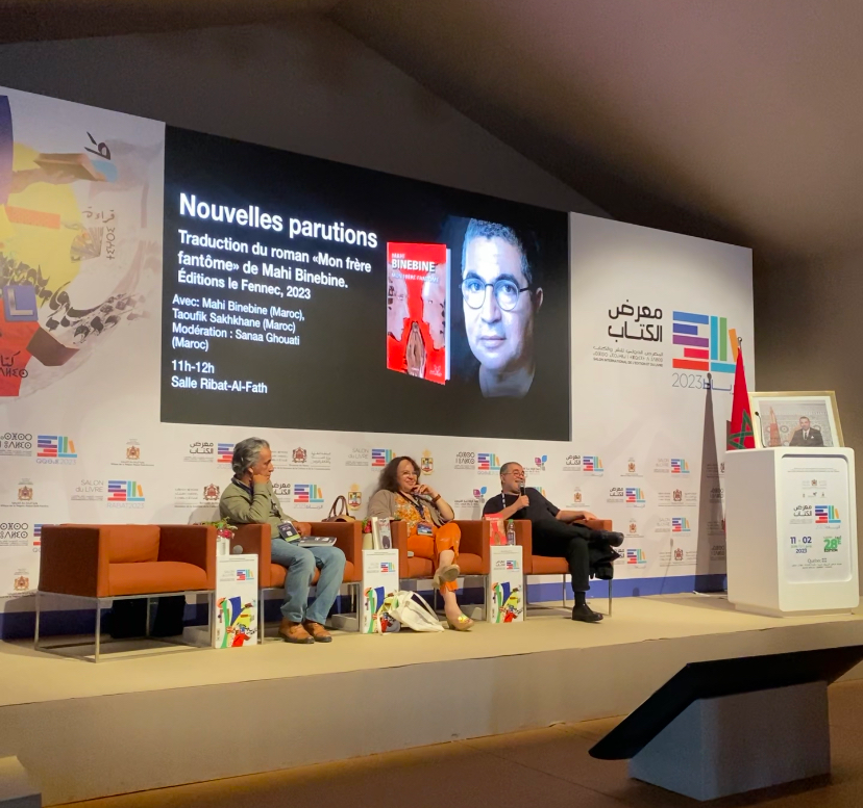
The International Publishing Book Fair hosts a meeting at the Ribat al Fath Hall, presenting the literary work “Mon frère fantôme” to an eager audience.

The International Publishing Book Fair hosts a meeting at the Ribat al Fath Hall, presenting the literary work “Mon frère fantôme” to an eager audience.

The International Publishing Book Fair hosts a meeting at the Ribat al Fath Hall, presenting the literary work “Mon frère fantôme” to an eager audience.
The event featured the author Mahi Binebine and the translator Taoufik Sakhkhane.
The book in question, " Mon frère fantôme" recently translated by Sakhkhane to Arabic and published by Le Fennec, delves into the vivid complexities of Marrakesh, transporting readers to a world where a young guide navigates through life alongside an enigmatic persona of his ownself. One embodies order, while the other revels in chaos.
Born into the shadows of Marrakesh, Kamal, a young man, gifted with linguistic skills, an uncanny ability to connect with others, and a talent for dialogue, Kamal seeks success and escape from his circumstances. However, within him reside two opposing personas, reminiscent of both Siamese twins and bitter adversaries. The question looms: Who will ultimately prevail? This captivating story reflects a complexity that exists within our very souls.
During the panel, Pr.Sanaa Ghouati moderated the discussion, guiding the conversation towards the process of translation and the unique challenges faced by Taoufik Sakhkhane. The translator shed light on his experience in rendering the novel into different languages. "I consider myself fortunate to be intimately familiar with the city of Marrakech" Sakhkhane explained. "It enabled me to write about a universe that I know and relate to, ensuring an authentic representation of the book's setting."
Translating a work while preserving its essence and emotional impact proved to be the greatest obstacle for Sakhkhane. "It's a delicate balancing act" he remarked. "The goal is to convey the author's intended message without losing the linguistic and cultural nuances that make the text come alive."
Sakhkhane emphasized that his translation was not merely literal but a quest to capture the essence of Binebine's intentions within the Arabic language. The translator stated that the Arabic language, being rich and expressive, possesses all the necessary tools to faithfully translate Binebine's text.
Answering the question of the extent to which the translation was successful, Sakhkhane said that “the essence of the translated book lies in the hands of those who read it" he concluded.
In a conversation with the author himself, Mahi Binebine shed light on his inspiration for "My Phantom Brother." He described the novel as a tale that unveils the true essence of Marrakech, a city where duality thrives. "We all have a touch of schizophrenia within us" Binebine shared.
He also expressed his satisfaction with the translation of his book stating "The translations of my own works have even revealed aspects of the story that I was not aware of, allowing me to uncover new layers of meaning." Binebine acknowledged the transformative power of translation, noting that it can enhance certain aspects of the narrative. "Translation offers a second life for the work, bringing a new vitality into the story" he expressed.
The discussion also touched upon the oral dimension of Binebine's work. The moderator expressed her fascination with the author's style, stating, "With each of Mahi's books, I can almost hear his words spoken aloud…There is an oral quality that brings his narratives to life."
The meeting was an exploration of " Mon frère fantôme " offering a glimpse into the vibrant world described by Mahi Binebine through his own experience. Readers are invited to immerse themselves in the vivid tapestry of Marrakesh, experiencing the richness of the city and the complexities of the human self.
